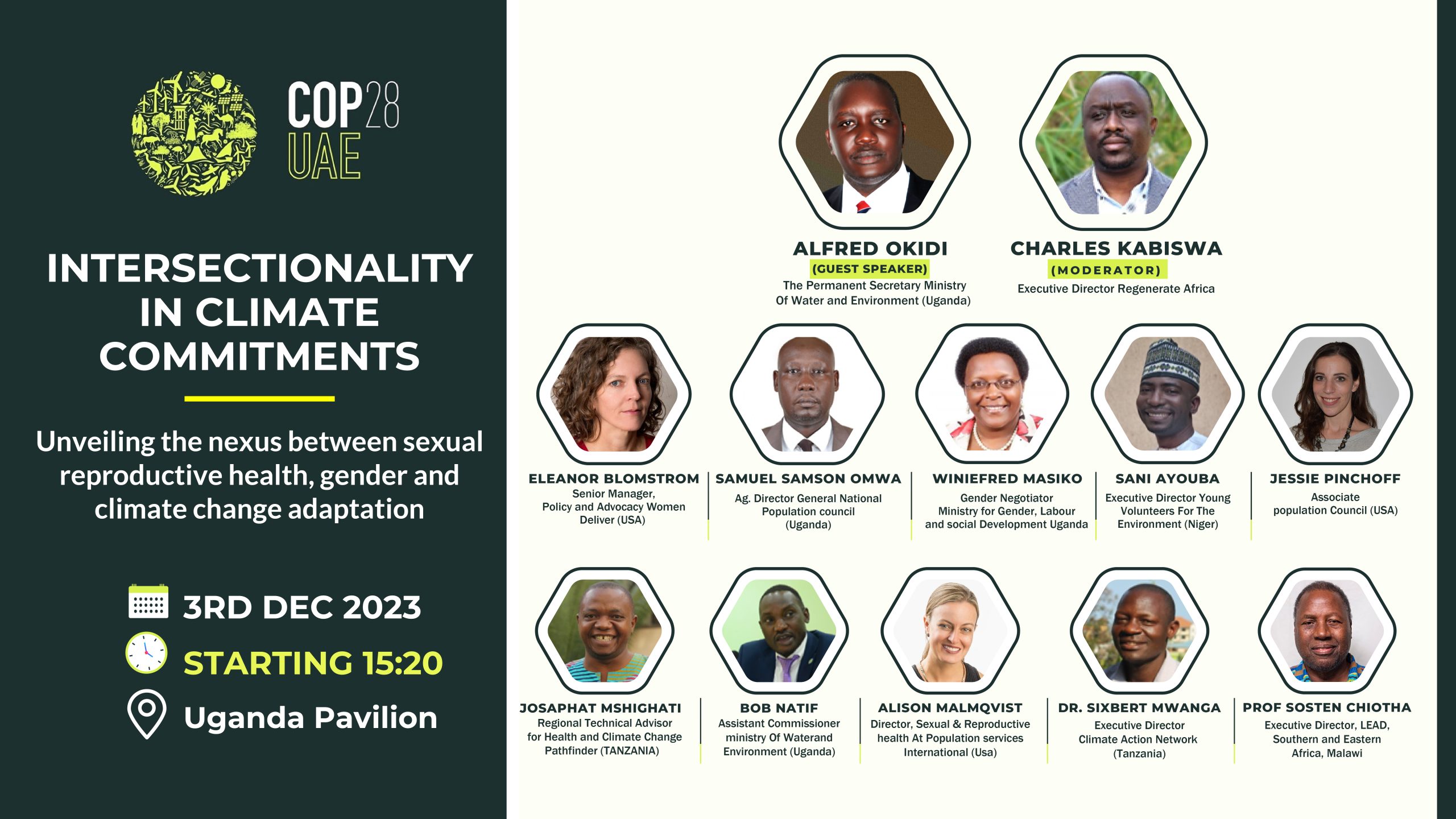Regenerate Africa hosted a side event during the COP28 meetings in the Ugandan Pavilion on the 3rd of December, 2024. It was hosted by our Executive Director Charles Kabiswa, and featured speakers from Uganda, Malawi, Kenya, Nepal, USA, Tanzania, Niger, Rwanda, Madagascar among others.
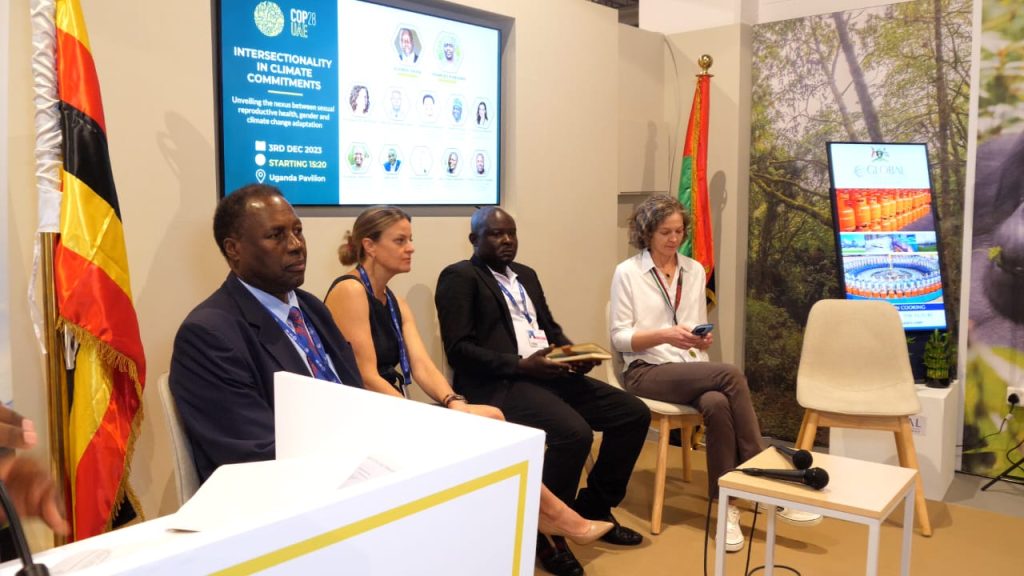
The session commenced with an address from the Permanent Secretary of the Ministry of Water and Environment, who delivered an insightful opening speech on the intersectionality of health, gender, and climate change. He emphasized that climate change is not gender-neutral and has far-reaching impacts that intersect with various aspects of people’s lives, creating differential vulnerabilities and opportunities. He further highlighted that understanding and addressing this intersectionality is crucial for crafting comprehensive climate commitments that leave no one behind.
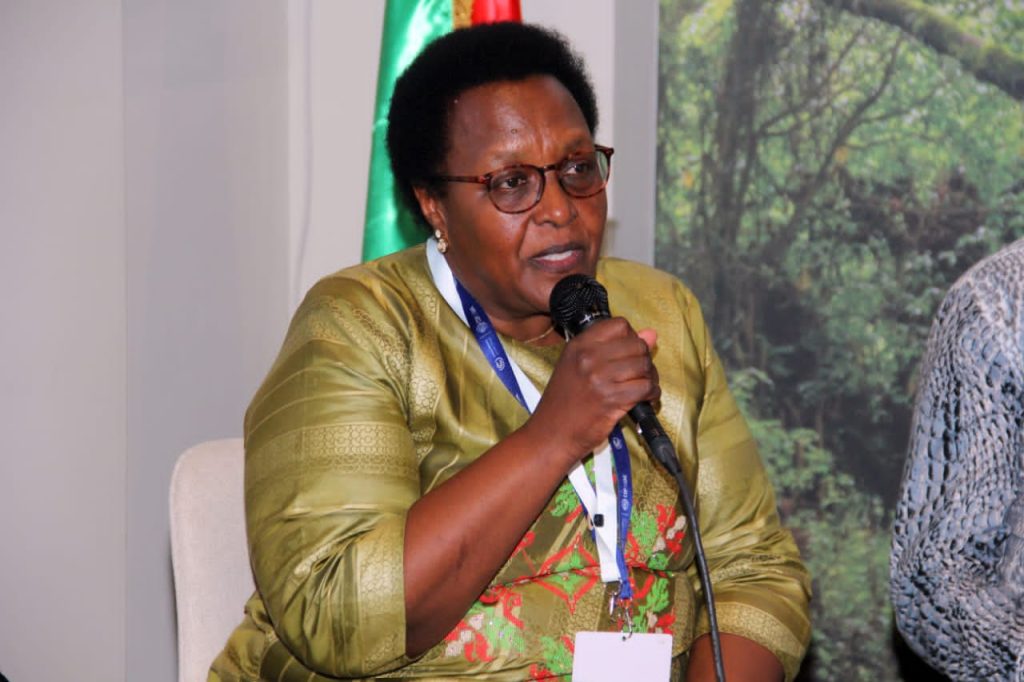
Following the opening remarks, a panel discussion was held, where ten panellists from government and various organizations shared their views on the topic. The discussion was engaging and informative, with each panellist providing unique perspectives on the intersectionality of health, gender, and climate change.
During the discussion, the speaker from Pathfinder International shed light on the obstacles that hinder intersectionality. The speaker pointed out that programming has been compartmentalized for a long time, and the challenges faced by communities are intersectoral, which means that they require inter-sectoral solutions. The speaker also highlighted that these challenges disproportionately affect girls and women. Furthermore, the speaker noted that donor funds have been designed to cater to specific sectors of their own interests, with only a few funders considering intersectionality. The speaker emphasized the need to fund and implement intersectional programs, which would help achieve multiple outcomes in a short period of time.
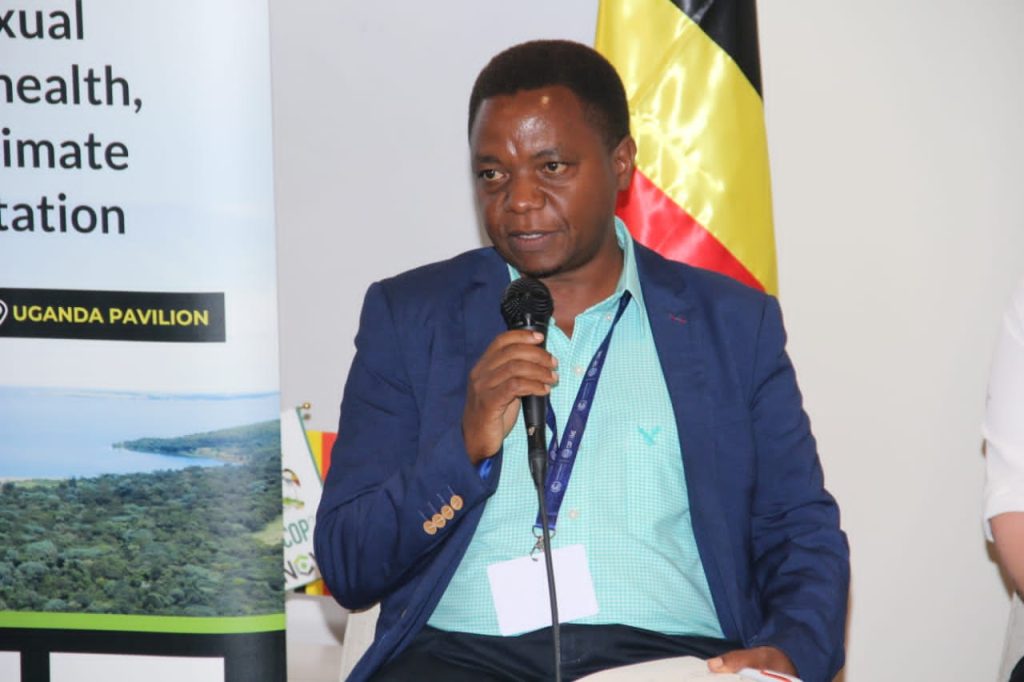
The speaker from the Population Council (USA) shed light on the numerous challenges faced by women and girls amidst climate change impacts. The speaker highlighted the fact that women and girls are particularly vulnerable to the effects of climate change, which has led to an increase in child marriages. Additionally, the speaker noted that climate change has also altered traditional gender roles, with women being forced to take on more masculine roles in order to adapt to the changing environment. Unfortunately, this has resulted in a rise in Gender Based Violence cases, as women are often subjected to violence and abuse when they step outside of their traditional roles. Overall, the speaker emphasized the need for urgent action to address these challenges and ensure that women and girls are protected and empowered in the face of climate change.
During the discussion, it was highlighted that conversations around intersectionality often face obstacles due to political interests. The fear of losing power and not being re-elected often prevents politicians from advocating for issues related to intersectionality that may not be supported by everyone. This can lead to a lack of progress in addressing the complex and interconnected issues faced by marginalized communities. It was emphasized that it is important for politicians to prioritize the needs of all their constituents, including those who are often overlooked or underrepresented, in order to create a more just and equitable society.
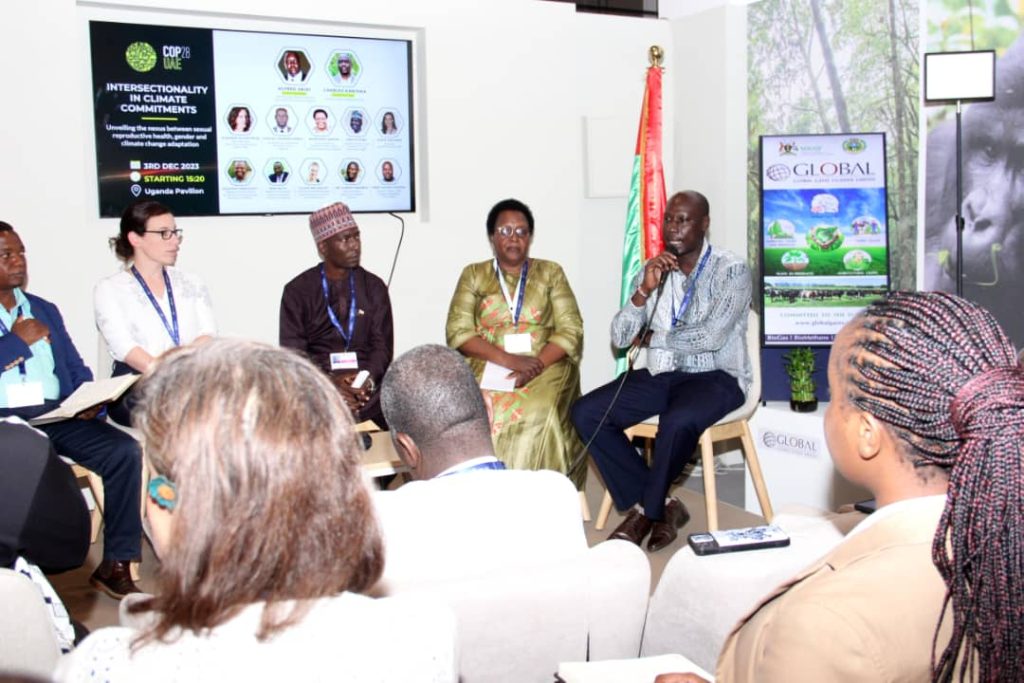
Hon. Winifred Masiko, the UNFCCC gender negotiator for Uganda, recently shared some valuable insights on the integration of Sexual and Reproductive Health and Rights (SRHR) into gender and climate actions. The Ministry of Water and Environment, Ministry of Gender, Labour and Social Development, with support from FAO have initiated the development of a United Nations Climate Change Gender Action Plan. This plan presents a significant opportunity for the integration of SRHR into climate change policies and actions. Hon. Masiko emphasized the importance of leveraging these discussions at the global level to influence conversations and decisions. She also highlighted that the revision of the Global Gender Action Plan is currently underway, with submissions required by 31st March 2024. Therefore, SRHR activists must take advantage of this opportunity to advocate for the inclusion of SRHR in the plan.
To achieve this, Hon. Masiko stressed the need for participants to work closely with their negotiators at the national level to influence global processes and ensure that SRHR is integrated into climate change policies and actions. Overall, Hon. Masiko’s insights provide a clear roadmap for the integration of SRHR into gender and climate actions, and highlight the importance of advocacy and collaboration at both the national and global levels.
The Acting Director of the National Population Council in Uganda drew attention to the country’s high fertility rate, which is currently growing at a rate of 3%. He emphasized that this growing population presents a unique opportunity to leverage the demographic dividend, but only if we recognize the importance of intersectionality programs. The Director went on to discuss some of the initiatives that the NPC is undertaking to address intersectionality, including the development of a PHE network and a National Population Policy, as well as collaborating with various stakeholders to integrate intersectionality into their programming. Additionally, the NPC is utilizing the Parish Development Model, which was created by the government, to integrate health initiatives into various programs. Despite these efforts, the Director acknowledged that there are still challenges to overcome, such as working in silos, limited data and research. However, he expressed optimism that these obstacles can be addressed by creating more platforms for sharing and improving information.
A representative from Women Deliver who is also a member of the SRHR and Climate Justice coalition highlighted that not much action has been taken around intersectionality. According to the representative, the health community has been primarily focused on building health systems, which has left little room for addressing SRHR issues despite it being a human right. The coalition expressed a desire to see intersectionality integrated into the Loss and Damage fund, climate financing and adaptation funds. They noted that most of the funds have been allocated towards mitigation, and it is crucial to include SRHR in these funds to ensure that it is not overlooked. To facilitate these conversations, a messaging guide has been produced. Although current opportunities do not bring forth the gender perspective, they are entry points that can be harnessed for further discussions. The coalition emphasized the need to focus on climate finance and increase access to it.
A representative from the African Institute for Development Policy (AFIDEP) highlighted the need to adapt to the way communities already work. The representative noted that our training has been siloed, which has influenced our practice. To further advance intersectionality, governments should include these issues in their policies and programs. Additionally, young people can play a crucial role in promoting intersectionality. Overall, the discussion emphasized the importance of recognizing and addressing the complex ways in which different forms of discrimination intersect and impact individuals and communities.
A representative from PSI (Population Services International) highlighted the crucial role that women’s health and sexual and reproductive health and rights (SRHR) plays in their ability to lead. The speaker emphasized that individuals are often the best experts on their own problems and goals, and it is our responsibility to support and empower them, particularly young people, to achieve their aspirations. The importance of collaboration was also stressed, as it allows for mutual learning and growth. Finally, the speaker issued a call to action to funders to provide accelerated funding for intersectionality programs, which aim to address the complex and interconnected issues faced by marginalized communities.
The representative from Climate Action Network Tanzania highlighted the issue of health in developing countries and its lack of clear linkage with other sectors. The speaker emphasized that health challenges can significantly impact the productivity of populations, making it crucial to integrate health initiatives with other sectors to achieve overall development. The representative further mentioned that Tanzania has already taken steps to integrate health in its Country NAP, but there is still a need to further integrate it with the education sector. The speaker stressed the importance of being well-prepared at the national level to achieve the advocacy goals at the global level. Overall, the representative from CAN Tanzania emphasized the need for a comprehensive approach to health and development that involves collaboration across different sectors.
During a recent meeting, the representative of the commissioner from the Ministry of Water and Environment in Uganda shared some insightful information about the country’s progress in developing policies and programs to address climate change. The representative noted that Uganda has made significant strides in creating policies that are tailored to the unique situation in the country. However, the country is still projected to experience temperature increases ranging from 1-12.5 degrees Celsius and a reduction of rainfall between 1-15%, which will leave many areas vulnerable to the effects of climate change. To prepare for these future events, it is crucial to have accurate data. The representative emphasized the importance of including health in the climate change policy and NDCs. The health sector conducted a risk assessment on human health and health infrastructure, which informed the development of these documents. He noted that the UNFCCC encourages ministries to develop plans that address mitigation, adaptation, and capacity-building gaps. These plans can be used to create solutions that will help reduce the impact of climate change on the country.
He further emphasized that the participation of young people in climate change negotiations is crucial while reporting that the climate change department has taken steps to empower young people with the necessary skills and knowledge to effectively advocate for their concerns in these negotiations.
This is a positive step towards ensuring that the voices of the younger generation are heard and taken into account in the fight against climate change.
